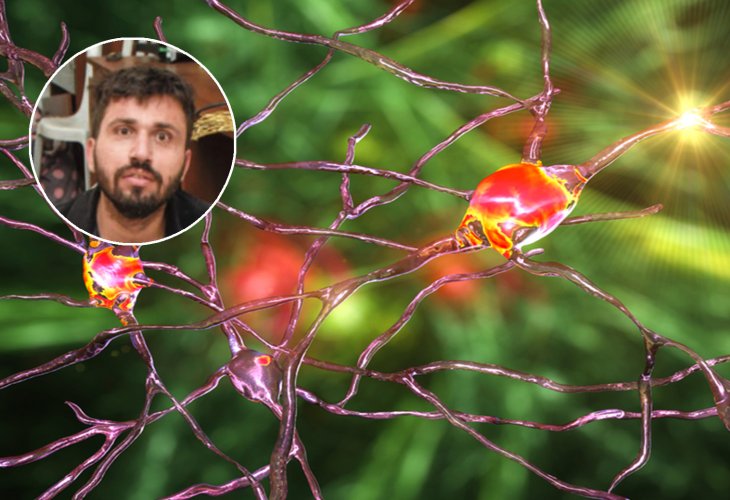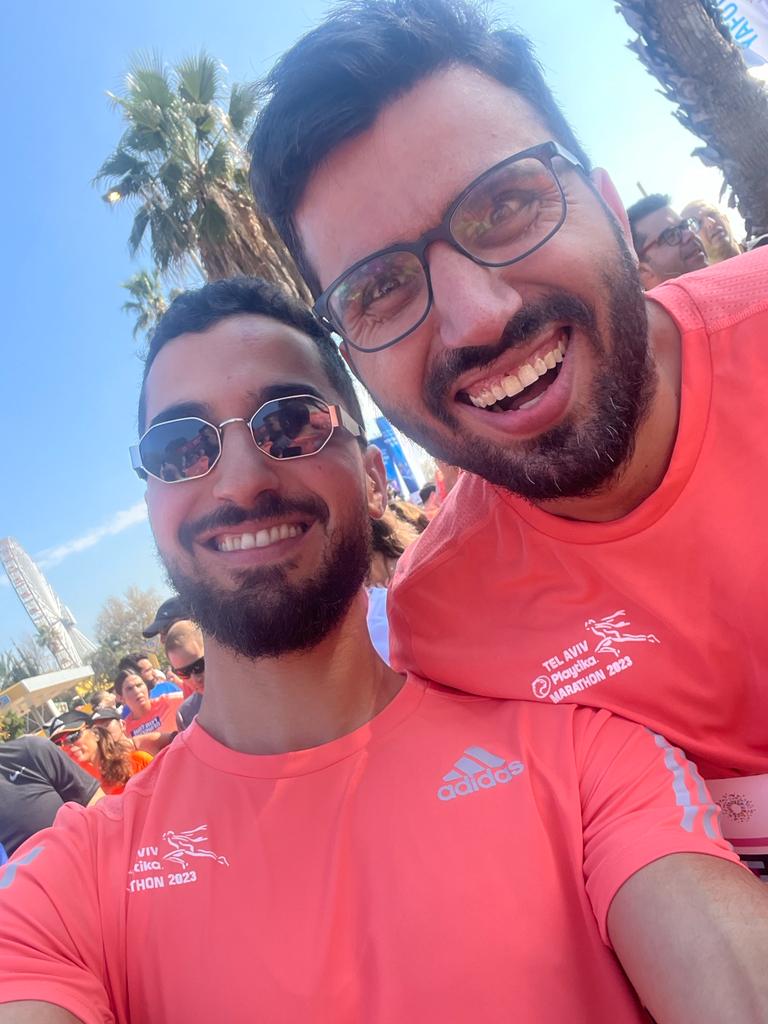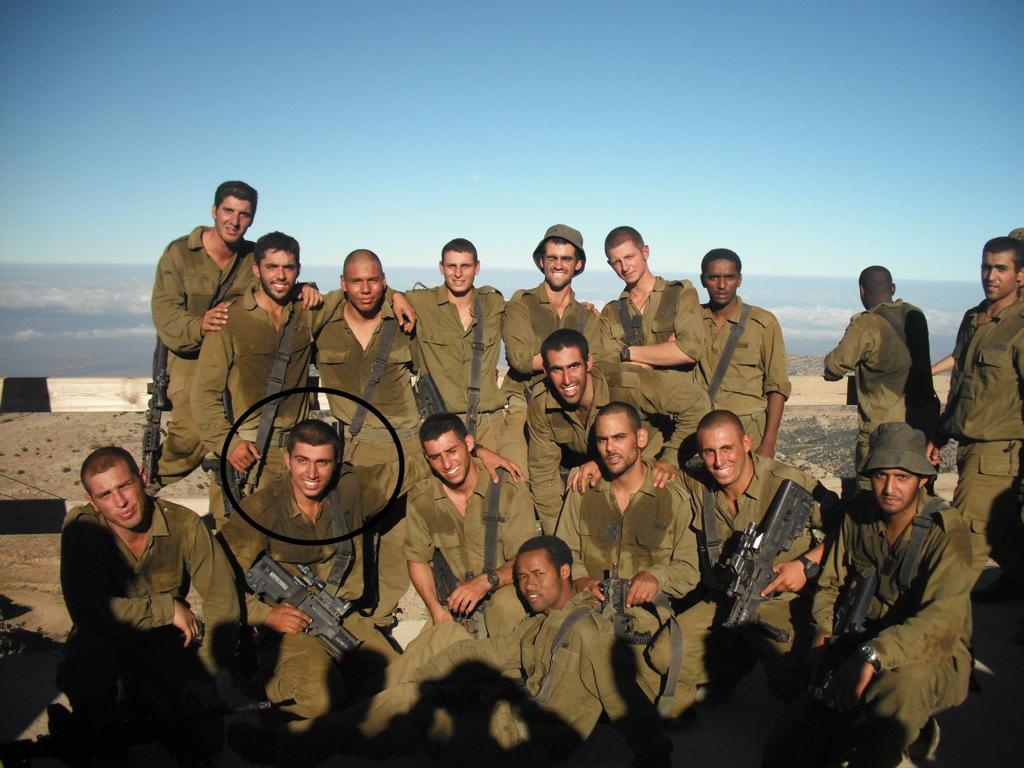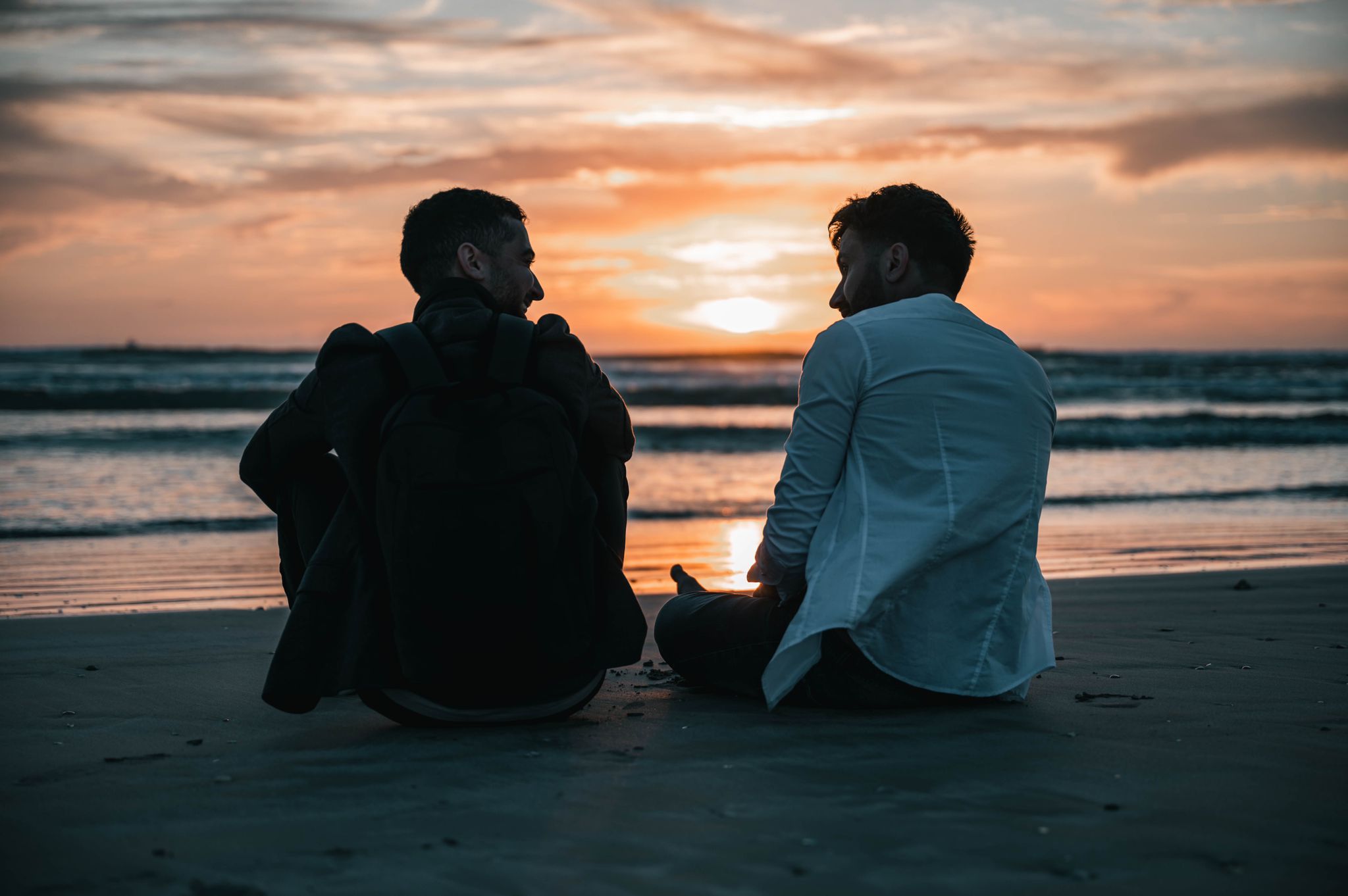"I Didn’t Want to Get Tested, I Knew My Life Would Stop if I Was Positive"
Facing a difficult diagnosis, Arthur Lazarev finds strength despite the challenges of Huntington's disease. "It's not a pessimistic story," he insists, "because even when everything is dark, you can choose to see the light." An inspiring conversation.
 In the circle: Arthur Lazarev (Background photo: Shutterstock)
In the circle: Arthur Lazarev (Background photo: Shutterstock)"I will keep talking as long as I can, and I won't stop," Arthur Lazarev tells me, a patient with Huntington's disease, a very severe progressive illness that struck him about nine years ago.
He sits in his apartment in Akko, occasionally getting up to drink a glass of water, then sitting back down. During our conversation, he repeatedly makes the same movements. "This is not me, it's the disease," he says, "It's not that I've always been like this, with a short attention span."
He was born in the Caucasus thirty-two years ago and immigrated to Israel with his mother at the age of eleven. His mother sought a happy future for him, but even as a child, she was diagnosed with Huntington's disease, a rare, hereditary, and incurable terminal illness. "From a very young age, I saw the difficulties my mother went through due to the disease," Arthur notes. "My mother had severe muscle degeneration, suffered from involuntary movements, Alzheimer's, severe cognitive problems, and depression. In her last years, she couldn't communicate with the environment and was unable to care for herself. She spent those years in bed, on the third floor, in a crumbling building without an elevator."
Arthur speaks these words with great pain. Clearly, it is not easy for him to recall those days, both because of his struggles caring for his mother as a young teenager and even more so now, as he sees those same symptoms manifesting with precision in himself.
"The difference between my mother and me is that I have no family or siblings to support me," he says with pain. "I do have friends, but I have no relatives in the country. Also, my mother's disease was discovered around the age of 40, while my symptoms started to appear at age 23, stronger than my mother's."

"I Didn't Want to Get Tested"
Despite all the hardship and pain, Arthur is undoubtedly inspiring. With the smiles he sends everywhere, the dedicated care he gives his dog that runs around him, and by traveling across the country to give lectures to children, teenagers, and adults, he aims to strengthen and encourage people to see the light even in difficult situations.
"It's true that it's not easy for me, but I decided to be the one managing life, not letting life manage me," he explains. "The truth is, this desire began to beat in me even before the disease broke out. Already when I enlisted in the army, I knew I was joining an elite unit that would demand a lot from me. It wasn't obvious at all, as I am an only child, and my mother's condition was very severe, but I felt inside that this is how I would feel satisfied and know I was making the most of my abilities."

After the army, Arthur knew he wanted to work in a field that helps people, so he began working with troubled youth. "I invested a lot in this," he says, "I developed leadership programs and took teenagers on field trips; I had apprentices I mentored, helped, and received great satisfaction. I felt I was contributing and giving of myself."
But then, at 23, he began to show symptoms that he feared so much that he didn’t even dare to express his fears out loud. "The first time I noticed it was when I was driving," he says, "Suddenly I felt small involuntary movements that wouldn't let me sit comfortably. I tried to convince myself it was maybe due to work and study stress. I was afraid and didn't want to be tested; I knew that if I tested, I might discover that my whole life was over."
He takes a deep breath, gets up again, and pours himself a glass of water. "It's an action I'm still capable of doing," he remarks, "and I will keep doing it as long as I'm able. I can't make coffee in the morning anymore, but I can pour water into a glass, so I'm happy and don't forget to be thankful for that every day."
You said you didn't want to get tested, so how that the disease was discovered?
"For three years, I suppressed it, didn't share with others that I had symptoms, and tried to ignore it. But at 26, the symptoms worsened, and I had no choice; I understood there was no other way, and I had to get tested. That's how I underwent the test and received the harshest answer of all – I have Huntington's disease, which manifested in me more severely than in my mother."
Arthur notes that he felt his life stopped. "Shortly before that, I had started studying for a Bachelor's degree in civil engineering, but when I realized I was sick, I stopped everything. I felt there was no point in spending money on professional studies when I knew that soon I wouldn't be able to sit and concentrate for more than a few minutes; I suddenly realized that all my future dreams wouldn't come true: I wouldn't be able to marry and have children naturally, wouldn't be able to work, and above all – wouldn't live to a ripe old age."
He speaks realistically, without fear, and seems to be looking at the disease head-on. "I don't deny my situation," he clarifies, "for years I watched my mother die, and I used to tell my friends that 'her soul is trapped inside her body,' and it pains me to think that I will reach such a state soon. But along with it, I also try to see the good things in the world because it is impossible to say that everything around is just bad."
Can you give an example of good things?
"There are such things, and even many. I frequently go out on trips with friends, see the beautiful world, and even participate in sports training. It's very important for me to do this to prove to everyone and especially to myself that I am still capable."
Surrounded by Friends
When talking about workouts, one cannot avoid mentioning Miter Katz, one of Arthur's good friends, who has been closely accompanying him in recent years. "Professionally, I am a fitness trainer," he says, "and I first met Arthur when he came to train with me following doctors' recommendations. I trained him a few times, and his progress was vast and contrary to predictions that constantly talked about a progressive disease, but following the training, a significant improvement was visible."
"The improvement was mainly reflected in the area of falls," Arthur remarks, "since I started training, I have almost not fallen, which is really rare for me."
"Since then, we've been together for several years," Katz says, "and it goes far beyond the connection of a trainer and trainee. I was privileged to discover a unique guy, with tremendous strength and admirable optimism."

Katz says he helps Arthur these days with a group of good friends to fulfill his big dreams, including raising funds for a big trip to the U.S. that he's planning soon, before the disease prevents it, as well as other dreams he aspires to achieve. "Arthur amazes us greatly, thank Hashem," he says, "and we wish him only health, with a clear belief that the salvation of Hashem will come in the blink of an eye."
Arthur, what gives you the strength to stay optimistic despite the difficult situation?
"I think it's my nature. I have always been an optimistic person, even when my mother was sick. I believe in the Creator of the world and know that what he does is good for me, and additionally, I feel that precisely from the place where I am today, I have the ability to influence, so I try to do so, give lectures, and strengthen people. When people come up to me after a lecture and tell me that I helped them or that thanks to me, they will start looking at life differently, it gives me a lot of strength."
And how do you feel when you hear others complaining about trivial things?
"I don't belittle them, because I was like that too, grumpy when things didn't go exactly as planned, sometimes complaining about nonsense. So yes, I hear them, take their words seriously, and feel in my heart that I have been granted a more correct perspective on the world, and it is definitely a gift. Sometimes I finally tell them: 'Be happy that these are your problems,' and also emphasize: 'Health is the most important.' I think everyone who knows me understands this without me saying."
In total, there are about 700 Huntington's patients in Israel, and Arthur sees it as his mission to fight for them as well. "Over the years, I have organized stand-up comedy shows for fundraising, some of which I have also performed," he says. "All the proceeds were for patients, to help them fund expensive medication and treatments, and also to encourage those who can invest in developing and raising awareness about the disease."
Is there a cure for the disease?
"There is no cure that heals Huntington's disease, but there is a medication that helps prevent repetitive movements, which is also very important. Until recently, the medication was not included in the health basket, and I, like the other patients, had to pay about 6000 shekels a month for it. Thanks to our activities and many others, the medication was included in the basket, and it was very good news."
Along with helping sick people, Arthur also tries to help healthy people. "When a parent has Huntington's, there is a 50% risk of passing the disease to each of their children, but today there is a possibility to undergo treatments before pregnancy, ensuring that the embryos are healthy, and it's very important to be aware of this option so that no one goes through this struggle. My dream is that there will be no more sick mothers in the world, nor sick children. I hope I will get to make it happen."

